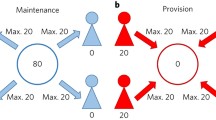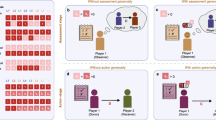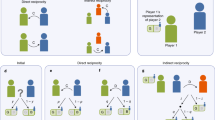Abstract
A collective action problem arises when the private incentives faced by individual members of a group are not properly aligned with their shared goals. Such problems can be overcome if opportunistic behaviour is restrained by explicit sanctions or internalized social norms. In particular, collective action is facilitated by norms of reciprocity that induce individuals to undertake pro-social actions whenever they expect others to do the same. From this perspective, collective action requires coordinated expectations and effective communication. Experimental evidence suggests that reciprocity norms are widespread in human populations, and evolutionary mechanisms that can account for their prevalence have been identified.
Access provided by CONRICYT-eBooks. Download reference work entry PDF
Similar content being viewed by others
Keywords
- Assortative matching
- Cheap talk
- Collective action
- Cooperation
- Coordination problems and communication
- Free-rider problem
- Public goods
- Reciprocity
- Social norms
- Subgame perfection
- Tragedy of the commons
JEL Classifications
Advancing the common interest of a group sometimes requires its members to sacrifice their private interests. Such situations, in which individual incentives are not properly aligned with shared goals, are called collective action problems. They arise frequently in economic and social life, for instance in the context of political mobilization, electoral turnout, pollution abatement, common property management and the provision of public goods. They can involve relatively small groups such as families, teams, or business partnerships, or very large groups that cut across national boundaries.
In his classic work on collective action, Mancur Olson (1965) conjectured that individuals would be unable to overcome such problems unless their behaviour was constrained by rules that were externally imposed and enforced. Along similar lines, Garret Hardin (1968) argued in an influential paper that, left to their own devices, individuals would face a ‘tragedy of the commons’ which could be overcome only by ‘mutual coercion, mutually agreed upon’. This view continues to have considerable currency in economics in the form of the free-rider hypothesis, which maintains that voluntary contributions that are socially beneficial but privately costly will not generally be observed (Bergstrom et al. 1986).
Despite the compelling logic underlying the free-rider hypothesis, there are numerous instances of groups having overcome collective action problems without external pressure, sometimes by designing and abiding by their own set of rules, and sometimes on the basis of less formal arrangements codified in social norms. The success of OPEC in constraining production to maintain price levels is based on a mutually beneficial agreement among member countries that has been sustained despite strong incentives for some producers to free-ride on the restraint practised by others. On a smaller scale, many examples of successful collective action in the management of local fisheries, forests, and other renewable resources have been documented (Bromley 1992; Ostrom 1990). Such resources are often held as common property, and the maintenance of sustainable stocks requires restraint in individual extraction levels. Restraint is typically enforced by formal or informal sanctions, and participation in such punishment mechanisms is itself a form of collective action. There also exist examples of collective action in the absence of any sanctioning mechanism. For instance, voter turnout is often substantial in large elections, contrary to the predictions of the free-rider hypothesis.
It has been argued that many instances of successful collective action arise in small and stable groups whose members interact with each other repeatedly. Under such circumstances, pro-social behaviour can be fully consistent with the standard economic hypotheses of rationality and self-interest. When interactions are repeated, self-interested cooperation can arise if one believes that non-cooperative actions will be punished in future periods. Moreover, such threats of punishment can be credible if abstaining from punishment is itself punished. Formally, cooperative behaviour can be sustained in subgame perfect equilibrium if interactions are infinitely (or indefinitely) repeated (Fudenberg and Maskin 1986). Hence the tension between individual and common interest is less severe and collective action more likely to arise in small and stable groups.
While the threat of future punishment or the promise of future reward might motivate collective action in some instances, there are many situations in which individual actions are unobservable or repetition too infrequent for such considerations to be decisive. Voter turnout, for instance, or private donations to charity are not easily explained as self-interested responses to material incentives. Similarly, sacrifices involving risks to life and limb, as in the case of battlefield heroism or spontaneous collective violence, are unlikely to be driven by a calculated response to future costs and benefits. What, then, could account for such phenomena?
There is now a considerable body of experimental evidence to suggest that many individuals are willing to take actions that further the common interest provided that they are reasonably sure that other group members will also take such actions. Furthermore, they are willing to sanction the opportunistic behaviour of others even at some cost to themselves (Fehr and Gächter 2000). The widespread prevalence of such preferences for reciprocity suggests that collective action can sometimes be viewed as a coordination problem: if the members of a group confidently expect others to further the common good, such expectations can be self-fulfilling. On the other hand, expectations of widespread free-riding can also be self-fulfilling, so building confidence in the behaviour of others is a critical ingredient of successful collective action. Communication among group members can help coordinate expectations, and it is therefore not surprising that allowing for communication among experimental subjects can result in dramatically increased levels of cooperation. This is the case even if communication takes the form of ‘cheap talk’, with neither threats nor promises being enforceable (Ostrom et al. 1992).
If preferences for reciprocity are indeed part of the explanation for successful collective action, this raises the question of how such preferences have come to be widespread in human populations in the first place. The existence of a willingness to sacrifice one’s own material interest for the common good poses an evolutionary puzzle. In order to survive and spread in human populations, the possession of such preferences must confer on an individual some advantage relative to those who are entirely self-interested. One intriguing possibility is that, despite being disadvantageous to individuals within groups, traits that are advantageous for the group itself may survive because of competition among groups:
There can be no doubt that a tribe including many members who, from possessing in a high degree the spirit of patriotism, fidelity, obedience, courage, and sympathy, were always ready to give aid to each other and to sacrifice themselves for the common good, would be victorious over other tribes; and this would be natural selection. (Darwin 1871, p. 166)
In order to be effective, however, this mechanism requires variability across groups to be sustained while variability within groups is suppressed (Sober and Wilson 1998). Whether or not the conditions for this are empirically plausible remains an open question.
There exist other channels through which a preference for reciprocity can be materially advantageous to individuals. One is assortative interaction: if individuals with preferences for reciprocity are more likely to interact with each other than with opportunists, the former can end up with higher material payoffs than the latter. Such assortation arises naturally in structured populations with local interaction. Even in unstructured populations with random matching, a propensity to reciprocate or to sanction opportunistic behaviour can confer an advantage provided that such preferences are observable to others. The visible possession of such propensities can alter the behaviour of those with whom one is interacting in such a manner as to be materially rewarding. Even opportunistic individuals might be induced to behave cooperatively in interactions with those who have a credible reputation for reciprocity. Such considerations can provide the basis for an evolutionary theory of reciprocity (Sethi and Somanathan 2001).
Reciprocity is a key feature of successful collective action, both in repeated interactions and in more spontaneous settings. The willingness to further the common good even at considerable personal cost is widespread in human populations, but is often contingent on the willingness of others to do the same. This perspective suggests that collective action problems are not insurmountable, but that communication and coordination are critical in overcoming them.
Bibliography
Bergstrom, T.C., L. Blume, and H. Varian. 1986. On the private provision of public goods. Journal of Public Economics 29: 25–49.
Bromley, D.W. 1992. Making the commons work: Theory, practice and policy. San Francisco: Institute for Contemporary Studies.
Darwin, C. 1871. The descent of man and selection in relation to sex. London: Murray.
Fehr, E., and S. Gächter. 2000. Cooperation and punishment in public goods experiments. American Economic Review 90: 980–994.
Fudenberg, D., and E. Maskin. 1986. The folk theorem in repeated games with discounting or with incomplete information. Econometrica 54: 533–554.
Hardin, G. 1968. The tragedy of the commons. Science 162: 1243–1248.
Olson, M. 1965. The logic of collective action: Public goods and the theory of groups. Cambridge, MA: Harvard University Press.
Ostrom, E. 1990. Governing the commons: The evolution of institutions for collective action. Cambridge: Cambridge University Press.
Ostrom, E., J. Walker, and R. Gardner. 1992. Covenants with and without a sword: Self-governance is possible. American Political Science Review 86: 404–417.
Sethi, R., and E. Somanathan. 2001. Preference evolution and reciprocity. Journal of Economic Theory 97: 273–297.
Sober, E., and D.S. Wilson. 1998. Unto others: The evolution and psychology of unselfish behavior. Cambridge, MA: Harvard University Press.
Author information
Authors and Affiliations
Editor information
Copyright information
© 2018 Macmillan Publishers Ltd.
About this entry
Cite this entry
Sethi, R. (2018). Reciprocity and Collective Action. In: The New Palgrave Dictionary of Economics. Palgrave Macmillan, London. https://doi.org/10.1057/978-1-349-95189-5_2395
Download citation
DOI: https://doi.org/10.1057/978-1-349-95189-5_2395
Published:
Publisher Name: Palgrave Macmillan, London
Print ISBN: 978-1-349-95188-8
Online ISBN: 978-1-349-95189-5
eBook Packages: Economics and FinanceReference Module Humanities and Social SciencesReference Module Business, Economics and Social Sciences




